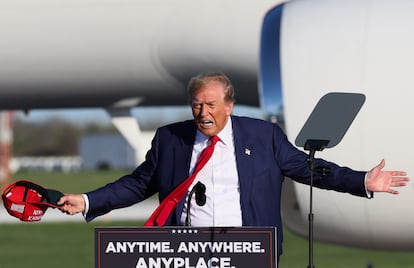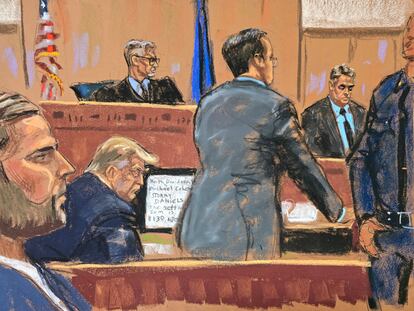Trump calls on police to subdue ‘raging lunatics’ protesting on US campuses
The Republican candidate took advantage of a break in the Stormy Daniels trial to stage rallies in Wisconsin and Michigan, decisive states in the November election


Donald Trump wasted no time Wednesday, when he was excused from the New York court where he faces a criminal trial — the first in history against a former U.S. president — stemming from hush money paid to porn actress Stormy Daniels to cover up an alleged extramarital affair. It was the first time since the trial began that the Republican presidential candidate, who is required by procedural law to sit in the dock every day, was afforded time to campaign. As such, Trump held not one rally, but two: the first, in the town of Waukesha, Wisconsin, and the second, in the late afternoon, in Freeland, Michigan. Both stops were in the heart of two pivotal states that promise to be the kind of arenas in which the November election that will pit him against President Joe Biden will be decided.
In the two municipalities, separated by Lake Michigan, he took the opportunity to refer to the student protests against Israel’s war in Gaza that have taken over college campuses across the U.S. and that early Wednesday morning led to an eviction at Columbia — as well as some 300 arrests — while violence between pro-Israel and pro-Palestine sympathizers erupted at UCLA. Trump invited the police to subdue what he described as “raging lunatics.” “There are a lot of negative forces in this country,” he said in Wisconsin. “To every college president, I say remove the encampments immediately. Vanquish the radicals and take back our campuses for all of the normal students.”
The former president has used those protests to try to downplay the far-right explosions of violence that defined the start of his term, in particular the white supremacist march that left one person dead and 40 injured in Charlottesville, Virginia, in the summer of 2017. The then White House occupant avoided condemning the neo-Nazis with a phrase that went down in history: “There were very fine people on both sides,” he declared.
Trump arrived first at the Waukesha convention center, where a crowd that had queued for hours was waiting for him according to Milwaukee media, eager to see one of the most famous men on the planet in their small Midwestern town of 70,000 inhabitants with their own eyes. Trump’s visit to Wisconsin was his second in a month, and he landed boosted by the polls: according to a local survey, he is two points ahead of Biden in Wisconsin six months ahead of the election. Waukesha County voted Republican in 2020.

Anti-immigration rhetoric
For an hour and a half, Trump delivered one of his characteristic improvised speeches that nonetheless contained his favorite topics, unconnected arguments, and jokes. He talked about immigration and the Biden administration’s management of the border with Mexico: “They come from the poorest and most crime-ridden countries in the whole world,” he said of immigrants to the U.S. He also claimed that Biden will raise taxes if he wins at the polls, and that this “will lead to the destruction of this country.” He also implied that Palestinian refugees resettled in the United States will bring “jihad.” This last argument led him to launch into one of his most-repeated promises, that of organizing “the largest deportation in history.”
Trump also did not miss the opportunity to attack the judge presiding over the Stormy Daniels case, Juan Merchan, who on Tuesday fined the former president $9,000 for contempt over comments on his social networks that, the magistrate considered, violated a gag order he had issued. He also threatened him with a jail sentence if he chooses to continue doing so.
“There is no crime. I have a crooked judge. He’s a totally conflicted judge,” said the Republican candidate, who insisted on defining the New York legal process and the other three criminal proceedings pending against him as maneuvers of ‘electoral interference.’ That gag order prohibits him from making public statements about witnesses, jurors, and other people related to the case, but the defendant is free to criticize Merchan, and he did so.
“I’m not allowed to talk about things. And nobody’s seen anything quite like it,” he complained to his supporters in a tone unlike that described by attendees at the Manhattan courthouse, where each day he listens to witnesses with a mixture of irritation and idleness, an attitude that sometimes even includes falling asleep in the dock.
When he was finished in Waukesha, the former president boarded his campaign plane, a Boeing 757 he likes to call “Trump Force One,” bound for Freeland, in central Michigan, where he gave his second rally of the day at the foot of the steps of the aircraft, making one of his dramatic entrances. Again, a crowd was anxiously awaiting him.
The script of Trump’s second show did not vary much. He defined the Stormy Daniels case as “the Biden trial,” expressed his desire to militarize the southern U.S. border with Mexico, and fantasized that the conflicts in Gaza and Ukraine shaking the geopolitical chessboard would not have erupted on his watch. He also opened a window into what a second term would be like if he regains the keys to the White House in November, as he did in an interview published in Time magazine. In it, his first with a print media outlet in a long time, he tidied up some of the ideas that sprinkle his rallies. And, again, he raised the specter of political violence if he does not win at the polls.
Sign up for our weekly newsletter to get more English-language news coverage from EL PAÍS USA Edition
Tu suscripción se está usando en otro dispositivo
¿Quieres añadir otro usuario a tu suscripción?
Si continúas leyendo en este dispositivo, no se podrá leer en el otro.
FlechaTu suscripción se está usando en otro dispositivo y solo puedes acceder a EL PAÍS desde un dispositivo a la vez.
Si quieres compartir tu cuenta, cambia tu suscripción a la modalidad Premium, así podrás añadir otro usuario. Cada uno accederá con su propia cuenta de email, lo que os permitirá personalizar vuestra experiencia en EL PAÍS.
¿Tienes una suscripción de empresa? Accede aquí para contratar más cuentas.
En el caso de no saber quién está usando tu cuenta, te recomendamos cambiar tu contraseña aquí.
Si decides continuar compartiendo tu cuenta, este mensaje se mostrará en tu dispositivo y en el de la otra persona que está usando tu cuenta de forma indefinida, afectando a tu experiencia de lectura. Puedes consultar aquí los términos y condiciones de la suscripción digital.








































